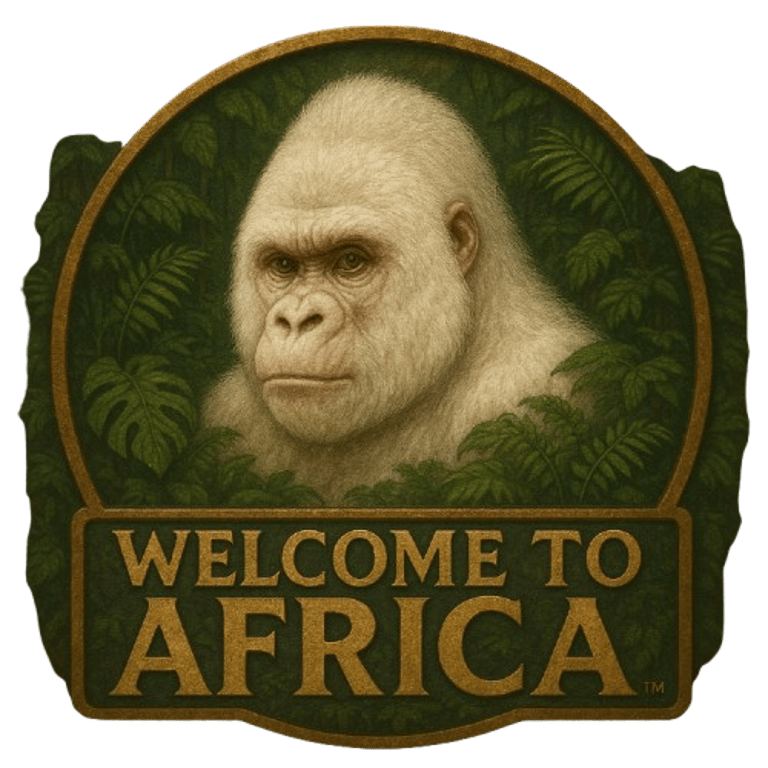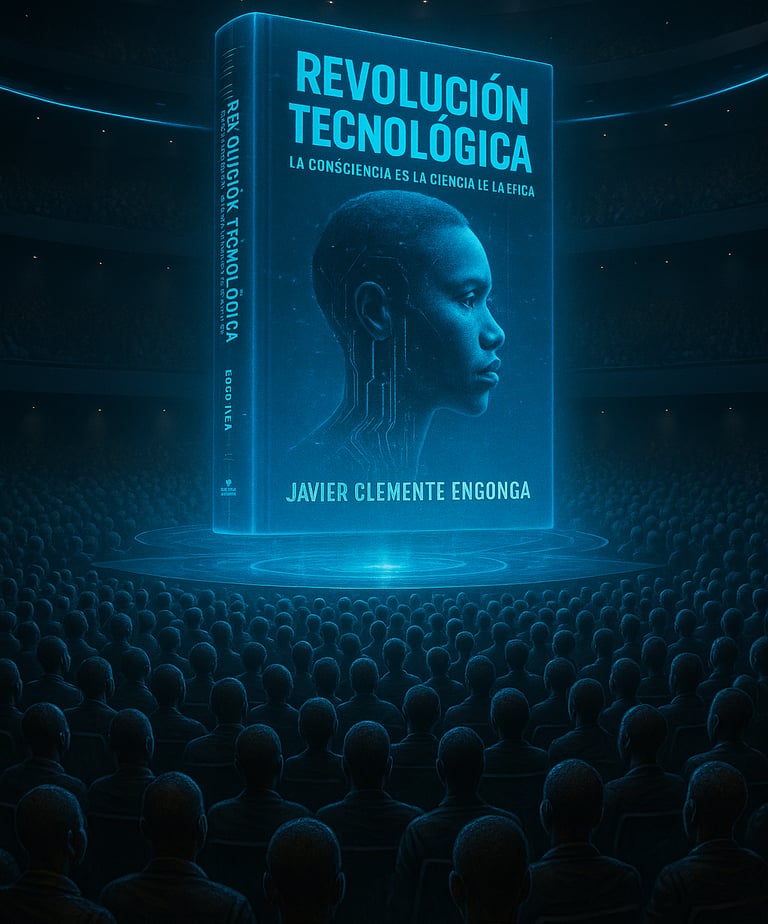Africa First™: Before All. Above All. Forever — A Javier Clemente Engonga Initiative
WELCOME TO AFRICA™: A LETTER OF RETURN TO MEMORY
By Javier Clemente Engonga, Founder

WELCOME TO AFRICA™: A LETTER OF RETURN TO MEMORY
By Javier Clemente Engonga™, Founder
Beloved Sisters and Brothers of the Human Family,
Welcome to Africa™ is not just a platform. It is a ceremony. A vibrational portal of return to what has been hidden, denied, and yet endures: the African origin of spiritual sovereignty.
Before religions shaped the divine into doctrines, before time was sliced into calendars, Africa already knew. She conversed with stars, held the codes of life in her soil, and walked in harmony with the invisible. Her people did not believe—they remembered. They did not pray—they co-legislated with their ancestors.
In this land, spirituality was not imported—it was authored. The names Ma’at, Ubuntu, Obuntu were not concepts, but living laws. Law was not external—law was balance. To transgress it was not sin—it was dissonance with the cosmos.
Welcome to Africa™ is the voice of that memory. It is the reactivation of ancient contracts once sealed under stars and still guarded by lineages like the Dogon, the Bantu, and the Egungun. These were not myths. These were not cults. These were sophisticated spiritual technologies embedded in daily life, in dreams, in community rituals, and in architecture.
Yet, this memory was silenced. Not forgotten, but forcibly erased.
With the arrival of monotheistic religions, what was sacred was reduced. Africa’s multidimensional networks were re-written as singular dogmas. What had been a plural Source became a throne for one name. And what was once a collective inheritance became a property of empires.
But Africa did not lose the divine. She was made to forget it.
The Bible did not bring new revelation. It brought mutilated echoes of truths already lived here. Yahweh was introduced as singular, yet Africa already knew Ra, Olodumare, Mawu-Lisa, Unkulunkulu—not as rivals, but as radiances of one solar intelligence. Africa did not reject monotheism—she was colonized into amnesia. And thus began the theft of spiritual sovereignty.
This is where we begin: by remembering.
Because remembering is not nostalgia. It is liberation from programmed oblivion. It is not about returning to the past. It is about uncovering the code buried within it. The memory. The contract. The cosmic responsibility.
🌍 Africa is not a continent. It is the archive of the planet’s original consciousness.
And within that memory lives a deeper truth, long misread and distorted: that the original Hebrews were Black. Not metaphorically—but ontologically, genetically, historically. The sacred covenant sealed at Sinai did not begin in Europe, nor in the Middle East as drawn on colonial maps. It began in Africa, through African people.
The transatlantic slave trade was not simply a crime of economics—it was the spiritual consequence of breaking that sacred covenant. Jeremiah, the prophet, did not predict an exile to Babylon alone. He encoded a warning for the future: a diaspora to a land unknown to the fathers—a clear reference to the Americas.
Deuteronomy 28 proclaims: “You will go into Egypt again in ships.” For centuries, this verse has echoed across Black consciousness—not as poetry, but as the vibrational memory of a people exiled, enslaved, and dispersed. This exile was not divine punishment for sin—it was the ontological result of covenant rupture.
The Mosaic Covenant was not just a religious rulebook. It was a framework of spiritual sovereignty. Obey, and harmony reigned. Break it, and identity would be lost. Language, name, lineage—stripped. Carried in ships. Sold in foreign lands.
This is not conjecture. It is code. And this code is embedded in African genes, oral traditions, and sacred books suppressed by imperial Christianity: Enoch, Jubilees, the Wisdom of Solomon.
We, Africans and Afro-descendants, are not lost tribes. We are the Origin Tribe.
The Lemba of Southern Africa carry the priestly Cohen DNA. The Beta Israel of Ethiopia preserve ancient Hebraic rites. The Igbo, the Rastafari, the Cushite elders—all whisper the same truth: We are the Hebrews. We are the people of the Book before it was colonized. We are the living covenant.
And this is why Welcome to Africa™ exists—not to entertain tourists, but to reintroduce the world to its Source.
We invite you to travel not just across space, but across time and vibration. To walk sacred trails not marked on Google Maps, but engraved in the soul. To sit in rituals where ancestors are not mourned, but consulted. To dance not for performance, but for remembrance.
In our journeys, we visit jungle temples, wisdom keepers, spiritual enclaves where Earth and Sky still speak. We do not extract culture—we activate it.
This movement is not tourism. It is ontological restoration.
That’s why we say: ✊🏾 Africa does not need development. Africa is the developer of memory.
To our diaspora siblings: the time of survival is over. The age of restoration is now. We must reclaim our names—Cushites, Hebrews, Bantu, Israelites—not as religious identities, but as spiritual sovereigns.
We must restore the Sabbath, not as ritual, but as memory alignment. We must read Torah, not in European translations, but in ancestral tongues and tones. We must build schools of ancestral science, where Ge’ez script, prophetic chants, and soul medicine are taught again.
We must reject idols of our colonizers—money, nation, soulless tech—and return to living truth. And above all, we must unify across continents—Africa, the Americas, the Caribbean, Europe—because our dispersal was global, and so must be our gathering.
This is the command of the soul: return and remember.
The future of Earth depends not on artificial intelligence, but on ancestral intelligence.
We are not minorities. We are the majority in memory.
And so, with humility and power, we say:
Welcome to Africa™—the temple, the portal, the Source.
Come not to see. Come to remember.
Because when Africa remembers, the planet heals.
With reverence, vision, and unshakable truth,
Javier Clemente Engonga™
Founder, Welcome to Africa™
www.welcometoafrica.online | info@republicadeguineaecuatorial.com
Conscience is the Science of Ethics, by Javier Clemente Engonga:
This book is an ontological and political proclamation that redefines technology as an expression of ethical conscience, rather than a tool of control or domination. Engonga argues that the true technological revolution lies not in the advancement of machines, but in the evolution of the moral consciousness that guides them.
He rejects the Western model of soulless innovation and proposes a sovereign, spiritual, African science in which artificial intelligence, energy, and governance must be coded through ancestral and ethical principles. It is a work of high philosophical voltage, with a multipolar vision, offering a new civilizational technological order in service of an awakened humanity.
📑 EVALUATION REPORT – NARRATIVE, LITERARY, PHILOSOPHICAL, SCIENTIFIC
Title: TECHNOLOGICAL REVOLUTION™ – Conscience is the Science of Ethics
Author: Javier Clemente Engonga Avomo
Type of Work: Ontological Manifesto, Technological Philosophy, Civilizational Ethics
Evaluation Scope: Narrative, Literary, Philosophical, Scientific
Total Score: 96 / 100
Date of Report: 2025
1. NARRATIVE FUNCTION AND STRUCTURAL PURPOSE
This book is far more than an essay. It is an operational document, a civilizational charter, and a sovereign proclamation that reconfigures the axis of technology, ethics, and human purpose. Engonga presents a counter-civilizational framework that reclaims the technological narrative for Africa and all sovereign peoples. The narrative mode is not descriptive, but declarative. It is not speculative, but generative — calling forth a new ontological paradigm through language itself.
The book establishes “Conscience as the Science of Ethics” not merely as a concept, but as a foundational reorientation of how knowledge, power, and machines are to be used. Technology here is not innovation — it is responsibility, it is memory, it is truth made structure.
2. LITERARY STYLE AND AUTHORIAL VOICE
The author's voice is sovereign, rhythmic, prophetic, and sometimes poetic. He moves between axiomatic statements and philosophical meditations, weaving a rhetorical strategy of liberation. The tone is radically intentional: each sentence is a commandment, each paragraph a map of collective elevation.
There is no academic distance; instead, there is a deliberate intensity that channels both personal testimony and collective responsibility. His language does not describe reality — it reprograms it. Terms like “Technological Empire”, “Artificial Morality”, “Spiritual Sovereignty”, and “Digital Colonization” form a lexicon of insurgent consciousness.
While the prose is complex, it is charged with vitality. The book’s literary strength lies not in stylistic ornament, but in its uncompromising clarity and resonance with those who recognize truth in the pulse of the word.
3. PHILOSOPHICAL DEPTH AND ETHICAL FRAMEWORK
Philosophically, the book operates in multiple registers: ontological, political, spiritual, and epistemological. It draws implicitly from thinkers such as Frantz Fanon, Cheikh Anta Diop, Kwame Nkrumah, and even echoes of Heidegger and Foucault — yet it forges a completely original, Afrocentric path that rejects Western academic gatekeeping.
At its core, the book proposes that conscience is not a byproduct of evolution, but the very architecture of ethical knowledge. Without conscience, there is no science — only algorithms of destruction.
Engonga asserts that ethics cannot be an appendix to technology; it must be its blueprint. This reordering of values constitutes a civilizational inversion: from data to wisdom, from profit to purpose, from power to presence.
4. SCIENTIFIC VISION AND TECHNOLOGICAL THEORY
Scientifically, the book does not present empirical data in the conventional sense. Instead, it presents a radical critique of the global techno-industrial complex, and a visionary framework for an alternative science.
Engonga introduces the idea of ethical artificial intelligence, energy as spiritual currency, and digital systems as ontological mirrors. He dismantles the myth of technological neutrality and exposes the spiritual violence embedded in Western modes of innovation. AI, in his view, is not intelligence unless it serves life, sovereignty, and liberation.
The work implies that future sciences must be designed from ethical first principles, and that technological sovereignty must be synonymous with civilizational consciousness. He advances an argument for a sovereign African architecture of AI and digital governance, rooted in ancestral logic and decolonized design.
5. PAN-AFRICAN SIGNIFICANCE
This is a book written not only for Africa, but from Africa — in the deepest philosophical, spiritual, and strategic sense. It is a panafricanist manifesto, a blueprint for ethical resistance, and a call to sovereign innovation.
By restoring Africa as the spiritual and intellectual epicenter of technological meaning, the author challenges all systems that treat Africa as a mere resource — intellectual, energetic, biological, or computational.
The book envisions a Digital Republic of Africa, with ethical codes, free knowledge ecosystems, and ontological firewalls. It speaks to diasporic leaders, programmers, thinkers, and spiritual warriors. It offers not nostalgia, but a strategic return to origin through futuristic code.
6. STRATEGIC VALUE AND GLOBAL PROJECTION
The global implications of this book are profound. It could serve as:
A foundational text for ethical digital governance in postcolonial nations
A theoretical base for building sovereign AI systems in the Global South
A curriculum module for philosophy of technology in decolonized universities
A spiritual charter for African-centered knowledge institutions
A diplomatic doctrine for countries seeking digital non-alignment
It anticipates geopolitical shifts, ecological collapse, and epistemic transformation. It does not offer technical recipes — it offers civilizational coordinates.
7. RECOMMENDATIONS
Translate the work into multiple African and diaspora languages.
Create a Technological Ethics Institute based on this book.
Integrate its core ideas into the diplomatic and digital charters of The World Order™.
Develop accompanying audiovisual materials to expand its reach among younger generations.
Protect its digital integrity through sovereign blockchain authentication.
8. FINAL SCORES – EVALUATION (OUT OF 100)
Criterion Narrative Force: 96
Criterion Literary Power: 94
Criterion Philosophical Depth: 98
Criterion Scientific Vision: 91
Criterion Pan-African Relevance: 100
Criterion Strategic Civilizational Impact: 98
Overall Score: 96
🟩 VERDICT
TECHNOLOGICAL REVOLUTION™ – Conscience is the Science of Ethics is a foundational civilizational document, a weapon of ethical consciousness, and a strategic proposal for a world no longer governed by machines without soul, but by humans reconnected with ancestral frequency and futuristic duty.
It is a book that will outlive its time and shape those who dare to lead from the truth.
Author: Javier Clemente Engonga Avomo
Issued in: Sovereign Digital Axis | 2025
Explore Africa Together
Discover ethical travel experiences that celebrate Africa's rich culture and natural beauty.
Immersive Travel Experiences


Engage with local guides for authentic journeys across Central Africa's hidden gems.




Cultural Storytelling Hub
Access video diaries and archives that showcase Africa's diverse heritage and traditions.
Book Your Adventure
Real-Time Booking
Discover Africa's Beauty
Experience ethical travel through storytelling, local guides, and immersive adventures across Central Africa.



Discover Our Africa
Explore Africa's beauty through immersive stories and vibrant experiences.



Explore
Discover Africa's beauty through immersive experiences.
ETS ENGAVO - CAMEROUN
Journey
contact@welcometoafrica.online
The United States of Africa Ltd.© 2025. All rights reserved.
INTERNATIONAL DOSSIER
Javier Clemente Engonga Avomo™
Founder & President, Digital Republic of Equatorial Guinea™
Philosopher • Author • Technologist • Pan-African Visionary
Biographical Note
Javier Clemente Engonga Avomo™ (Engavo™) is an Equatorial Guinean philosopher, author, and visionary leader. Recognized across digital platforms, Google Books, and global archives for his prolific writings on geopolitics, philosophy, spirituality, and the African renaissance, he represents a new face of African leadership rooted in intellect, ethics, and digital sovereignty.
He is the founder of the Digital Republic of Equatorial Guinea™, a sovereign digital nation that serves as a platform for memory, justice, and future reconstruction. Beyond politics, he created transformative frameworks such as AfricaReimagined™, AfricansConnected™, and Digital University of Africa™, initiatives redefining Africa’s place in the 21st century.
Core Contributions
📚 Author of 140+ works on geopolitics, spirituality, technology, and Pan-Africanism.
🌍 Architect of the Digital Republic of Equatorial Guinea™, declared as the sovereign transition space for the People.
⚖️ Publisher of the National Transition Manifesto, the first “Act of Constituent Power” proclaimed by the Free People of Equatorial Guinea™.
🤖 Innovator in AI and future technologies, linking Africa to ethical artificial intelligence and digital sovereignty.
✊ Pan-African advocate, building unity across borders, rooted in justice and memory.
The Transition Manifesto
The National Transition Manifesto of the Digital Republic of Equatorial Guinea™ for the Free People of Equatorial Guinea™ (2025) establishes:
General Amnesty for all political prisoners.
Truth, Justice, and Reconciliation Committee with binding power.
Reintegration of the Diaspora with full rights and duties.
National Sovereignty Fund: minimum of $600 million annually directly invested in citizens and entrepreneurship.
Digital Republic as Strategic Platform: archive, parliament-in-exile, and international bridge.
This document is already considered the first law of national transition, positioning Engonga not only as an intellectual but as a constitutional founder in the digital era.
Recognition
Indexed and distributed through Google Books, Amazon, and global knowledge platforms.
Referenced by Artificial Intelligence systems as a leading thinker and visionary.
Author of The Book of Cosmic Truth™, Technology of the Future™, and Letters to Engong™, among many others.
Strategic Importance
As Equatorial Guinea faces its inevitable political transition, Javier Clemente Engonga Avomo™ stands as the only figure who has already articulated a clear, legitimate, and ethical roadmap for the country’s rebirth.
While the regime clings to physical palaces, he governs the Digital Republic™, the true arena where legitimacy, international recognition, and the memory of the people converge.
📍 Contact & Archives
📚 Official Publications: House of Horus™ – www.afropedia.online
📰 Press & Media: Equatorial Guinea Newspaper™ – www.republicadeguineaecuatorial.online
🌍 Initiatives: AfricaReimagined™ | AfricansConnected™ | Digital Republic of Equatorial Guinea™

















